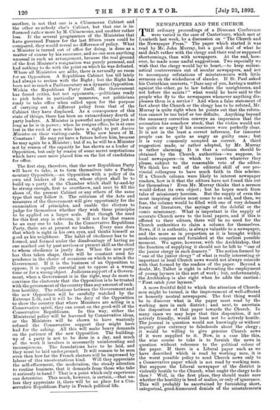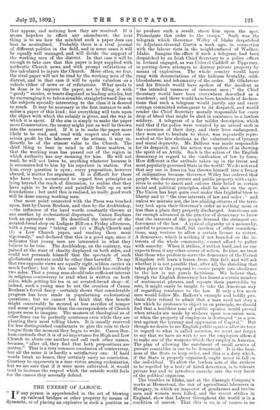NEWSPAPERS AND THE CHURCH. T HE ordinary proceedings of a Diocesan
Conference were varied in the case of Canterbury, which met at Lambeth last week, by a discussion on " The Church and the Newspaper Press." The paper which started it was read by Mr. John Murray, but a good deal of what he said dealt rather with the clergy and their real or supposed shortcomings, than with newspapers. At the end, how- ever, he made some useful suggestions. Two especially we wish that the clergy would lay to heart,—to keep ecclesi- astical controversies out of secular newspapers, and not to accompany refutations of misstatements with little sermons on the wickedness of slander. If St. Paul asked his Corinthian converts, "Dare any of you, having a matter against the other, go to law before the unrighteous, and not before the saints ?" what would he have said to the people who fly to the newspapers whenever anything dis- pleases them in a service ? And when a false statement of fact about the Church or the clergy has to be refuted, Mr. Murray is quite right when he points out that the refuta- tion cannot be too brief or too definite. Anything beyond the necessary correction conveys an impression that the accusation has somehow stuck, that the victim would not be quite so angry if his conscience were perfectly clear. It is not in the least a correct inference, for innocent people can be quite as angry as guilty ones ; but it is very commonly accepted as correct. A third suggestion made, or rather adopted, by Mr. Murray is rather alarming. It is that a column should be obtained by the Church authorities—we suppose, in local newspapers—in which to insert whatever they please, subject to the reasonable veto of the editor. We think too well of the editorial skill of our pro- vincial colleagues to have much faith in this scheme. If a Church column were likely to interest newspaper readers, how is it that the editors have not found this out for themselves ? Even Mr. Murray thinks that a sermon would defeat its own object ; but he hopes much from tales of missionary heroism. But the supply of even the most inspiring stories must come to an end, and then, we fear, the column would be filled with one of very debased forms of literature, the sayings of the doleful or the comic missionary. What is important is the supply of accurate Church news to the local papers, and if this is offered to their editors, there will be no need for the Church authorities to claim a column for themselves. News, if it is authentic, is always valuable to a newspaper, and the more so in proportion as it is brought within moderate compass and furnished at the earliest possible moment. We agree, however, with the Archbishop, that the function of supplying it should not be left to " one of the junior clergy in each deanery." The notion formed by " one of the junior clergy" of what is really interesting or important in local Church news would not always coincide with that formed by the readers of the paper. Beyond a doubt, Mr. Talbot is right in advocating the employment of young laymen in this sort of work ; but, unfortunately, the Archbishop is also right when he adds the caution : " First catch your laymen."
A more fruitful field to which the attention of Church- men might be turned, is the improvement of well-affected or honestly neutral newspapers. The first thing would be to discover what is the paper most read by the working men in each district ; and next, to ascertain the disposition of that paper towards the Church. In many cases we may hope that this disposition, if not actively friendly, would at least not be actively hostile. The journal in question would not knowingly or without inquiry give currency to falsehoods about the clergy ; it would be willing to give genuine Church news if it were supplied to it. Now, in a case like this, the wise course to take is to furnish the news in question without reference to the political colour of the paper. If there is a Liberal paper such as we have described which is read by working men, it is the worst poissible policy to send Church news only to a Conservative paper which is not read by working men. But suppose the Liberal newspaper of the district is violently hostile to the Church, what ought the clergy to do then ? Well, in the first place, they should make sure whether the hostility is bred of malice, or only of ignorance. This will probably be ascertained by furnishing short, categorical, good-humoured denials of the misstatements that appear, and noticing how they are received. If it seems hopeless to effect any amendment, the next thing is to see how the mischief such a paper does can best be neutralised. Probably there is a rival journal of different politics in the field, and in some cases it will be equally well managed, and will divide the support of the working men of the district. In that case it will be enough to take care that this paper is kept supplied with authentic Church news, and with prompt refutations of lies calculated to injure the Church. More often, we fear, the rival paper will not be read by the working men of the district, and in that case it will be quite valueless as a vehicle either of news or of refutations. What needs to be done is to improve the paper, not by filling it with " goody " stories, or tracts disguised as leading articles, but by encouraging it to take a sensible, straightforward line on the subjects specially interesting to the class it is desired to reach. It may be necessary in the first instance to sub- sidise a paper of this kind ; but everything will turn upon the object with which the subsidy is given, and the way in which it is spent. If the aim is simply to make the paper more Conservative, the money might just as well be thrown into the nearest pond. If it is to make the paper more likely to be read, and read with respect and with con- scious profit by the labourer or the artisan, it may in- directly be of the utmost value to the Church. The chief thing to bear in mind in all these matters, is that the working man has passed out of the region in which authority has any meaning for him. He will not read, he will not listen to, anything whatever because it is recommended to him by his superiors in station. For him, every question is open ; every proposition, however absurd, is matter for argument. It is difficult for those who have been accustomed to regard first principles as lying beyond the reach of discussion, to realise that they have again to be slowly and painfully built up on new foundations ; but until this is realised, no really good work will be done among working men.
One more point connected with the Press was touched upon, first by Canon Benham, and then by the Archbishop, —the influence of the hard words constantly thrown at one another by ecclesiastical disputants. Canon Benham took an optimist view. He described the interior of the aerated-bread shop on Ludgate Hill on a Friday afternoon, with a young man " taking out (a) a High Church and (b) a Low Church paper, and reading them most vigorously," and declared that this is a good sign, since it indicates that young men are interested in what they believe to be true. The Archbishop, on the contrary, was pained at the want of charity displayed on both sides, and could not persuade himself that the spectacle of such gladiatorial contests could be other than harmful. To say that two opposite views are equally right, seldom carries us much further ; but in this case the shield has evidently two sides. That a young man should take sufficient interest in religious controversy to read what is written on both sides, while getting his tea in an aerated-bread shop—if, indeed, such a young man be not the creation of Canon Benham's fervid fancy—certainly shows that considerable progress has been made in popularising ecclesiastical questions; but we cannot but think that this benefit might conceivably be secured at less sacrifice of temper and sense of proportion than the correspondents of Church papers seem to imagine. The masters of theological as of other fence can be perfectly courteous even while they are planting their most telling blows. It is usually reserved for less distinguished combatants to give the rein to their tongue from the moment they begin to write. Canon Ben- ham contends that it is of no importance for High and Low Church to abuse one another and call each other names, because, " after all, they find that both propositions are untrue." That is a very common conclusion of controversy, but all the same it is hardly a satisfactory one. If hard words break no bones, they certainly carry no conviction. Courtesy to opponents is a rare virtue among ecclesiastics, but we are sure that if it were more cultivated, it would tend to increase the respect which the outside world feels for the causes they severally defend.



































 Previous page
Previous page